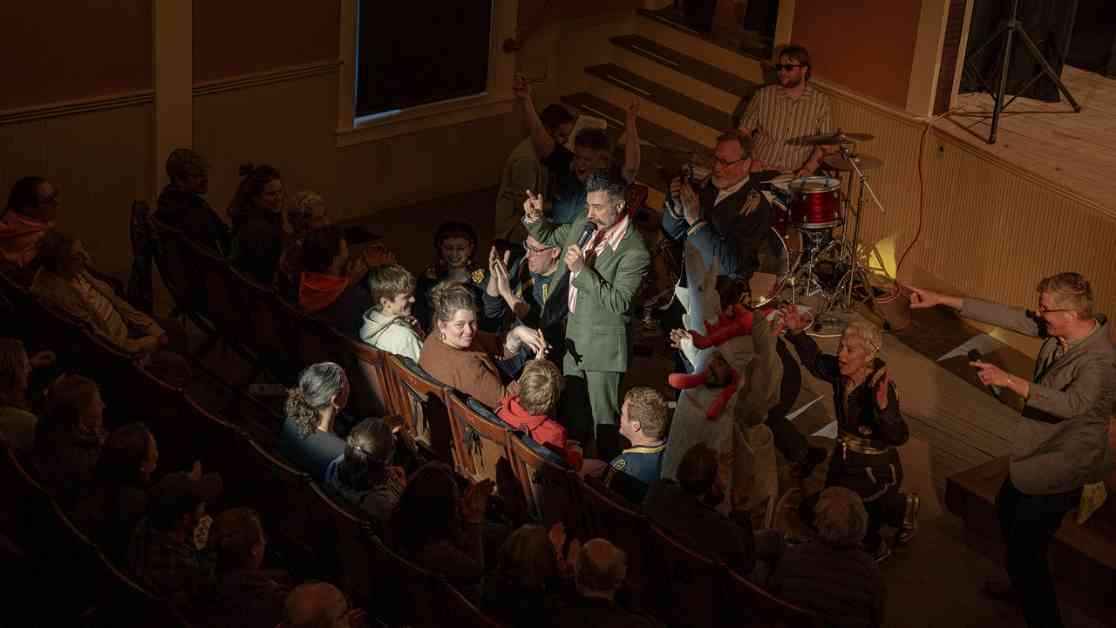In the quaint town of Hardwick, Vermont, a unique tale unfolds as the Civic Standard, a community organization, embarks on an unconventional journey of community-building through theatrical productions. Rose Friedman, the co-founder and director, led an audacious staging of “A Christmas Carol” with a cast of forty-five, transforming the small town into a vibrant village. This production, the Civic’s third, brought together a motley crew of performers, many of whom were not seasoned actors but eager participants from the local community.
Heather Lanphear, a familiar face at Buffalo Mountain Market, took on the role of Mabel the turkeymonger in the play. Initially assigned a minor role, Lanphear’s involvement deepened as she stepped into a speaking part, breathing life into a poignant moment of self-realization for her character. Lanphear’s journey from a passive observer to an active participant in the production exemplified the transformative power of community theatre.
For Friedman, the Civic’s theatrical endeavors served as a form of performance art, weaving together tales of the past with contemporary reflections on community values. By engaging neighbors and acquaintances in the storytelling process, Friedman aimed to create an immersive experience that resonated with the town’s collective consciousness. Through the lens of “A Christmas Carol,” the Civic explored themes of redemption, empathy, and personal growth, inviting audience members to reflect on their own lives through the prism of the classic tale.
Embracing Hardwick’s Rich Tapestry
Nestled in the scenic Northeast Kingdom of Vermont, Hardwick embodies a spirit of rugged individualism and self-sufficiency. Against a backdrop of natural beauty and historical significance, the town has weathered its fair share of challenges, from the pandemic to devastating floods. Amidst these trials, the Civic emerged as a beacon of hope, offering solace and connection to a community grappling with loss and isolation.
As Hardwick grappled with external perceptions and internal struggles, the Civic’s presence provided a unifying force that transcended traditional boundaries. French Canadian families, back-to-the-landers, dairy farmers, and artists found a common platform for expression and collaboration within the Civic’s vibrant ecosystem. By fostering a sense of belonging and shared purpose, the organization bridged divides and celebrated the diverse identities that defined Hardwick’s rich cultural landscape.
From Tragedy to Triumph: The Civic’s Evolution
The origins of the Civic can be traced back to a profound personal loss that transformed into a catalyst for community engagement. Tara Reese, co-founder of the organization, navigated the depths of grief following the tragic death of her son, Finn, whose spirit inspired a wave of collective mourning and resilience in Hardwick. Through the Civic’s activities, Reese found solace and purpose in serving her town, channeling her pain into a force for positive change.
As the Civic’s influence spread beyond Vermont’s borders, Reese and Friedman grappled with the complexities of their creation, confronting questions of identity, purpose, and sustainability. Their journey from outsiders to community leaders underscored the transformative power of art, empathy, and shared experience in fostering connections and healing wounded spirits. Through a series of theatrical productions, community events, and outreach initiatives, the Civic redefined the narrative of Hardwick, offering a new chapter of hope, resilience, and togetherness.
In the heart of Hardwick, amidst the snow-covered hills and winding rivers, the Civic Standard stood as a testament to the enduring spirit of a town united in its quest for meaning, connection, and belonging. As the lights dimmed on another successful production, the echoes of laughter, tears, and shared stories lingered in the air, a testament to the enduring power of community, creativity, and the human spirit.












